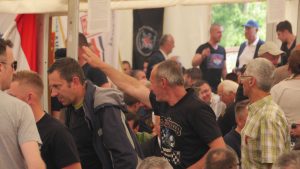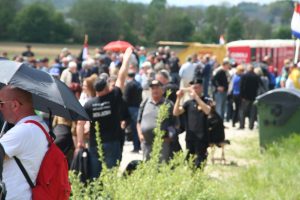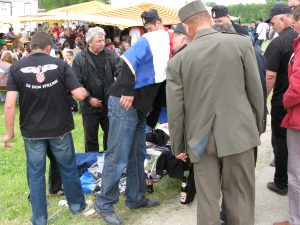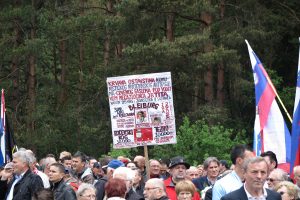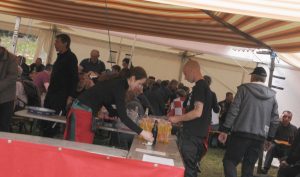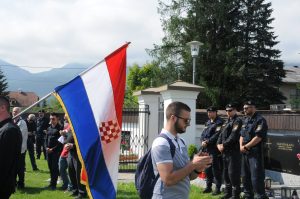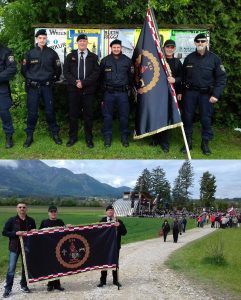The annual Ustaša meeting in Bleiburg / Pliberk can only take place with the support, or at least active disregard by the responsible local authorities and public institutions in their present form. An example of this is the "translation error" on the memorial stone: while in Croatian the "Croatian Army" before 1945 is commemorated, in German only the "fallen Croats" are commemorated (see "From field to pilgrimage site"). The authorities not only ignored this fact, but even agreed to the massive expansion and remodeling from a single memorial stone to the current memorial site, including the stage and cemetery.
Procession, event or assembly?
The annual ceremony in Bleiburg / Pliberk consists of a procession on public roads, as well as a rally on private grounds including a fair and political speeches. The local authorities take the easy way out: all parts of this multi-hour event are part of the church ceremony. Parking of 300 buses on a main road and bike path: church ceremony. Hitler salutes next to the memorial stone or on the main road on the way to the memorial stone: church ceremony. Sea of flags of far-right Croatian parties: church ceremony. Fascist T-shirts, flags and banners: church ceremony.
This is made possible by §5 of the Assembly Act, which excludes ecclesiastical (church) celebrations and processions from the restraints which apply to all other kinds of assemblies. In practice however, this is only possible because all levels of administration close their eyes to the fact that this is not just a church ceremony. Mayor, district commissioner and governor play along cheerfully. This perception is also perceivable in the official language: The celebration is called "Croatian celebration" and "former Mother's Day commemoration of Croatian emigration" (Ordinance of the Municipality of Bleiburg 2015) in internal documents of the municipality of Bleiburg / Pliberk and the district commissioners headquarters.
For years, the Carinthian state government has withdrawn itself to its position that only the Federal Government could take action against the event. For example, state commissioner Peter Kaiser noted at his inauguration on April 12th, 2018 in the Carinthian State Parliament, that these were "right-wing extremist rallies in the lap of a (…) church procession" (own translation) and that "the event [could] not be banned, legally (...) the Federal Ministry of the Interior would be responsible in accordance with the Police Security Act” (own translation) (see also Kurier 2018). As worthy of support as these clear words on the nature of the event may be, the inactivity of politics and administration is even more incomprehensible.
As already described, the celebration in Bleiburg / Pliberk is a central event for Croatian domestic politics, a fixture in the domestic political calendar. For example, the commemorations in 2015 and 2016 were the stage for elections that took place shortly thereafter. In 2016, Tomislav Karamarko, Croatian Deputy Prime Minister, and the neo-fascist Minister of Culture Zlatko Hasanbegović visited the meeting to use it for election purposes. However, since Recep Tayyip Erdoğan's election campaign in Austria in 2016, campaign advertisement and campaigning by foreign parties and representatives have been under special scrutiny. In 2017, the Right of Assembly was changed to make this more difficult in the future. Now, special conditions apply to the "intended participation of representatives of foreign states" (own translation) (§2, Abs. 1a VersG). This applies to the Bleiburg ceremony - if it were not for the fact that the Carinthian bishop makes the event a religious mass through his signature.
Lack of jurisdiction and Fake News
Numerous neo-Nazis and organized neo-fascists take part in the Ustaša celebration in Bleiburg / Pliberk. This is not denied, but officials act as if this cannot be prevented: Representatives of the organizers say that they have no influence, they have no attendance list of persons, since it is simply a commemoration of the church, to which anyone and everyone can come. The Catholic Church says they have no influence on the events outside the Catholic Mass, which is a private event. The security authorities (State Office for the Protection of the Constitution Carinthia - LV Kärnten, State Police Department Carinthia - LPD Kärnten and District Commission - BH Völkermarkt) state that one does not know in advance who will come to the ceremony, since it is a private event and the freedom of expression and assembly is to be protected at all all costs (see statement of the Diocese Gurk-Klagenfurt, LPD Kärnten and BH Völkermarkt 2018).
For the police and the security authorities in the Federal State of Carinthia / Koroška the problem is not the meeting itself, but rather the negative reports about it. The reports of fascist symbols, agitating songs and neo-Nazis from Austria, Croatia and Germany are leading to insecurity in the public and to criticism of the executive powers. Moreover, reports of at the ceremony present neo-Nazis would only draw the attention of like-minded people to the event, which would lead to even more neo-Nazis - leading to even worse news coverage. The solution is obvious to operations managers present at the event. Since they do not want to do anything against Hitler salutes, fascist symbols or neo-Nazis, one has to exclude the commenting media and photographers. While the authorities claim they are not able to recognize Neo-Nazis, they insinuate that journalists only want to report badly about Carinthia.
References
Donnerbauer/ Glanzl (2017): Hitlergrüße und Hakenkreuze: Das war das Nazi-Gedenken der katholischen Kirche in Bleiburg, in: vice.com, May 15th, 2017.
Kurier (2018): Landeshauptmann Kaiser gegen kroatische Gedenkfeier in Kärnten: https://kurier.at/politik/inland/landeshauptmann-kaiser-gegen-kroatische-gedenkfeier-in-kaernten/400024783, accessed on 28.10.2018.
Öllinger, Karl (2017): Sachverhaltsdarstellung an die Staatsanwaltschaft Klagenfurt. Betr.: Zahlreiche Verstöße gegen das Verbotsgesetzt durch Unbekannte am 13. Mai 2017 in Bleiburg/ Pliberk. Download: http://www.no-ustasa.at/wp-content/uploads/2018/04/Oellinger-Karl_Sachverhaltsdarstellung-Bleiburg-2017.pdf, accessed on 28.10.2018.
Stellungnahme von Diözese Gurk-Klagenfurt, LPD Kärnten und BH Völkermarkt (2018). Download: http://www.no-ustasa.at/presse/, accessed on 28.10.2018.
Verordnung der Stadtgemeinde Bleiburg (2015): Zahl: 120-2-1/Kro-1/2015, Betreff: Gedenkveranstaltung am 16.5.2015 – Loibacher Feld, Verkehrsmaßnahmen. Download: http://www.no-ustasa.at/wp-content/uploads/2018/04/VO-Gendenkfeier-16.05.2015.pdf, accessed on 28.10.2018.
